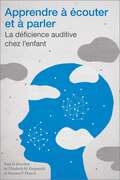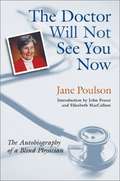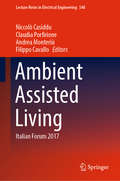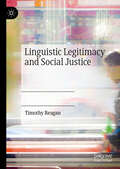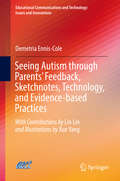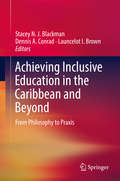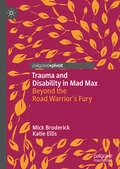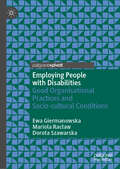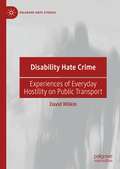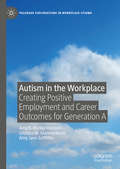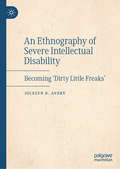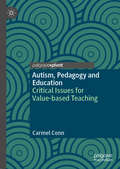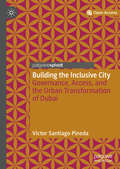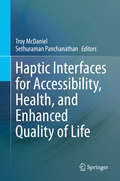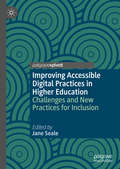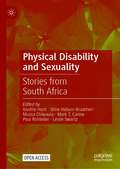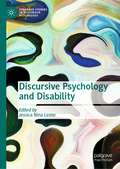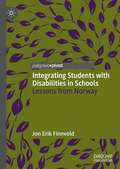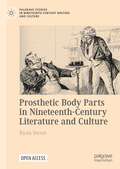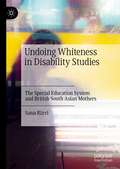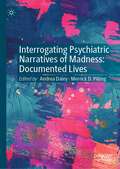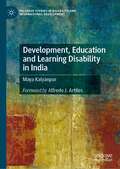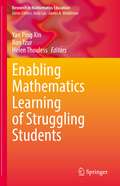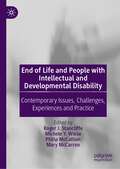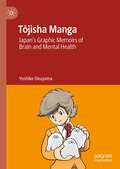- Table View
- List View
Apprendre à écouter et à parler: La déficience auditive chez l’enfant (Éducation)
by Elizabeth M. Fitzpatrick et Suzanne P. DoucetLa déficience auditive a un impact considérable sur plusieurs aspects du développement de l’enfant, y compris sur les habiletés de communication, l’apprentissage scolaire, les habiletés sociales et, au final, la qualité de vie de l’enfant et de sa famille. Par le passé, la déficience auditive présentait des obstacles presque insurmontables. De nos jours, la technologie et les techniques d’intervention permettent de mieux répondre aux besoins des enfants ayant une perte d’audition, et donc de les aider à devenir des membres à part entière de la société. Le dépistage précoce et la technologie d’amplification auditive font en sorte que nous vivons à présent une période charnière dans le domaine de l’éducation des enfants ayant une surdité. Cette éducation nécessite tout de même une intervention spécialisée de la part d’une équipe de professionnels, et ce, en collaboration étroite avec les parents. Compte tenu des approches novatrices dans le développement de méthodes d’apprentissage du langage verbal chez les enfants présentant des troubles de l’audition, la communauté internationale mise davantage sur la formation et le perfectionnement des professionnels. Appuyées par une équipe multidisciplinaire d’experts dans le domaine, les deux auteures abordent les principales problématiques médicales, technologiques, éducatives et sociales liées à ces troubles.Publié en français
The Doctor Will Not See You Now
by Jane PoulsonA spiritual autobiography by Dr. Poulson takes the reader by the arm through the story of her career as a sighted medical scientist who became blind in the first year of her professional career. No reader will fail to be astonished and inspired by her accomplishments and optimism.
Ambient Assisted Living: Italian Forum 2017 (Lecture Notes in Electrical Engineering #540)
by Andrea Monteriù Filippo Cavallo Niccolò Casiddu Claudia PorfirioneThis book documents the state of the art in the field of ambient assisted living (AAL), highlighting the impressive potential of novel methodologies and technologies to enhance well-being and promote active ageing. It covers a broad range of topics, with sections on technological sensors and platforms, social robotics for assistance, assistance and care applications, health and medical support methodologies and technologies, as well as the analysis, modelling and design of AAL services. <P><P> The book comprises a selection of the best papers presented at the 8th Italian Forum on Ambient Assisted Living (ForitAAL 2017), which was held in Genoa, Italy, in June 2017 and brought together researchers, technology teams and professional associations, as well as representatives of the Italian regions and advisors to the Italian Ministry of Education, University and Research, with the goal of developing a consensus on how to improve provisions for the elderly and impaired. The respective contributions offer valuable insights into how the latest advances can help address the needs of the elderly and those with chronic health conditions. They also underscore the need for AAL to continue moving toward multidisciplinary integration, so as to embrace the various disciplines that place the user of services at the centre of the design process.
Linguistic Legitimacy and Social Justice
by Timothy ReaganThis book examines the nature of human language and the ideology of linguistic legitimacy – the common set of beliefs about language differences that leads to the rejection of some language varieties and the valorization of others. It investigates a broad range of case studies of languages and dialects which have for various reasons been considered 'low-status' including: African American English, Spanglish, American Sign Language, Yiddish, Esperanto and other constructed languages, indigenous languages in post-colonial neo-European societies, and Afrikaans and related language issues in South Africa. Further, it discusses the implications of the ideology of linguistic legitimacy for the teaching and learning of foreign languages in the US. Written in a clear and accessible style, this book provides a readable and pedagogically useful tool to help readers comprehend the nature of human language, and the ways in which attitudes about human language can have either positive or negative consequences for communities and their languages. It will be of particular interest to language teachers and teacher educators, as well as students and scholars of applied linguistics, intercultural communication, minority languages and language extinction.
Seeing Autism through Parents’ Feedback, Sketchnotes, Technology, and Evidence-based Practices (Educational Communications and Technology: Issues and Innovations)
by Demetria Ennis-ColeSeeing Autism is a comprehensive but easy-to-understand guidebook for caretakers, parents, educators, counselors, therapists, and researchers on various aspects of rearing and supporting children with autism spectrum disorder. It provides textual and visual information on technology tools, symptoms, diagnosis, auditory, sensory, visual, physical, and educational issues, as well as strategies and practices to help children on the Autism Spectrum reach their potential. Seeing Autism uniquely capitalizes on sketchnotes, a visual thinking tool, to communicate information and practices. Sketchnotes provide a unique space that can help the reader think differently, generate a variety of ideas, explore alternatives, and develop constructive points for expressing ideas and developing visual communication aids. This book will assist parents, educators, and professionals in schools (counselors, school psychologists, librarians) who work with children diagnosed with ASD; it will help readers increase their knowledge of autism and gain an appreciation for evidence-based practices and forms of technology that can be used to support learners on the autism spectrum. “This book is a call to arms and is as much a resource for the family friend as it is for the provider coming to the home. In the book Seeing Autism, Dr. Demetria Ennis-Cole helps individuals gain an incredible perspective and learn the struggles, challenges and joys of families rearing children, teens and adults on the spectrum. This book covers the entire spectrum and is a fantastic mix of research, parent perspective, and even sketchnotes for visual learners. The material is well-balanced and is a great resource to support individuals on the spectrum at home, in the community or in the classroom." Brad McGarryFather, Speaker, Author and Director of the Autism Initiative at Mercyhurst University
Achieving Inclusive Education in the Caribbean and Beyond: From Philosophy to Praxis
by Dennis A. Conrad Launcelot I. Brown Stacey N. BlackmanThis book offers an international perspective of philosophical, conceptual and praxis-oriented issues that impinge on achieving education for all students. It sheds light on the historical, systemic, structural, organizational, and attitudinal barriers that continue to be antithetical to the philosophy and practice of inclusive education within the Caribbean. The first section of the book examines how globalized views of inclusion informed by philosophical ideas from the North have influenced and continue to influence the equity in education agenda in the region. The second section considers how exclusion and marginalization still occur across selected Caribbean islands. It provides both quantitative and qualitative data about the nature and experience of exclusion in selected Caribbean islands, the UK and USA. The third section tackles the practical realities of transforming education systems in the Caribbean for inclusion. In particular, it identifies teacher practices as the main site of interrogation that needs to be tackled if inclusion is to be successful. The fourth and final section examines the contribution of principals and exemplars to the development and advocacy for inclusive education. It discusses how educational leadership is understood, as well as the role of school principals in making inclusion a reality in schools, the challenges experienced and the qualities of education leaders.
Trauma and Disability in Mad Max: Beyond the Road Warrior’s Fury
by Katie Ellis Mick BroderickThis book explores the inter-relationship of disability and trauma in the Mad Max films (1979-2015). George Miller’s long-running series is replete with narratives and imagery of trauma, both physical and emotional, along with major and minor characters who are prominently disabled. The Mad Max movies foreground representations of the body – in devastating injury and its lasting effects – and in the broader social and historical contexts of trauma, disability, gender and myth.Over the franchise’s four-decade span significant social and cultural change has occurred globally. Many of the images of disability and trauma central to Max’s post-apocalyptic wasteland can be seen to represent these societal shifts, incorporating both decline and rejuvenation. These shifts include concerns with social, economic and political disintegration under late capitalism, projections of survival after nuclear war, and the impact of anthropogenic climate change.Drawing on screen production processes, textual analysis and reception studies this book interrogates the role of these representations of disability, trauma, gender and myth to offer an in-depth cultural analysis of the social critiques evident within the fantasies of Mad Max.
Employing People with Disabilities: Good Organisational Practices and Socio-cultural Conditions
by Ewa Giermanowska Mariola Racław Dorota SzawarskaDeveloping better employment and management practices for a diverse workplace is quickly becoming a major concern amongst most modern organisations; however, a lack of research into good practices has a limiting effect. Dealing specifically with disabilities, this pioneering work is based on international research spanning several European countries to demonstrate best practice. Aiming to fill a gap in knowledge, the authors offer interdisciplinary insights into managing diversity in the workplace, taking into account various social and cultural contexts. Providing analysis and recommendations for adapting organisational practices to different workplace settings, this Palgrave Pivot is a vital read for scholars of HRM and diversity management, as well as policy-makers and practitioners.
Disability Hate Crime: Experiences of Everyday Hostility on Public Transport (Palgrave Hate Studies)
by David WilkinThis book examines the experiences of disabled people on public transport to reveal the everyday abuses that many experience there, and the resilience that they need in order to conduct an ordinary life. This work represents an intertwining of personal journeys, with its author writing from first-hand experience, and now working as one of the leading researchers of disability hate crime (DHC) in the UK. DHC is an under-researched area and the findings in this book have implications beyond the public transport context. This book draws on a sample of 56 victim-participants and includes data drawn from public transport regulators, service operators and staff in the UK. Wilkin argues that established legislation needs to be recognised and implemented by regulatory and local authorities in order to reach equality objectives on public transport. Each chapter is clearly structured, accessibly written and includes key definitions which will speak to practitioners and academics with an interest in victimology, policing, social policy, gender studies, disability studies, migration studies, equality studies and religious studies. This book also examines how effectively authorities and service providers safeguard disabled people on UK public transport and reveals adaptive approaches to researching with disabled people.
Autism in the Workplace: Creating Positive Employment and Career Outcomes for Generation A (Palgrave Explorations in Workplace Stigma)
by Amy E. Hurley-Hanson Cristina M. Giannantonio Amy Jane GriffithsThis book explores the career experiences of Generation A, the half-million individuals with autism spectrum disorder (ASD) who will reach adulthood in the next decade. With Generation A eligible to enter the workforce in unprecedented numbers, research is needed to help individuals, organizations, and educational institutions to work together to create successful work experiences and career outcomes for individuals with ASD. Issues surrounding ASD in the workplace are discussed from individual, organizational, and societal perspectives. This book also examines the stigma of autism and how it may affect the employment and career experiences of individuals with ASD. This timely book provides researchers, practitioners, and employers with empirical data that examines the work and career experiences of individuals with ASD. It offers a framework for organizations committed to hiring individuals with ASD and enhancing their work experiences and career outcomes now and in the future.
An Ethnography of Severe Intellectual Disability: Becoming 'Dirty Little Freaks'
by Jocelyn D. AveryIn this ethnographic investigation of a special education needs college in Australia, Jocelyn D. Avery explores how the self-identity of people with severe intellectual identities is influenced by carers and support people in their lives. Employing theoretical foundations of self-identity and embodiment and drawing largely on Mary Douglas’s (1996) notions of ritual and hygiene, purity and danger, Avery argues that students in this environment are treated as though they exist in a vacuum, rather than a highly complex social environment: strategies to ‘contain’ their difficult selves ultimately lead to continued confinement, as if the students themselves were ‘contaminated’. In the midst of this much-needed ethnography, Avery meditates on her own role: matters of consent, communication, and cooperation pose a challenge to anthropological engagement with severe intellectual disability, but researcher ethics and positionality have their own difficulties. The reflection provided here will provide a guide for future researchers to sensitively engage with people with disability.
Autism, Pedagogy and Education: Critical Issues for Value-based Teaching
by Carmel ConnThis book discusses critical issues concerning autism and education, and what constitutes effective pedagogy for this group of learners. Autism is a high-profile area within the discipline of special education, and the issue of how to teach autistic learners remains a contested one: recent theorising has questioned a techno-rationalist approach that places the burden of change on the autistic pupil. The author explores the values that underpin educational approaches within existing pedagogical practice: while these approaches have their individual merits and shortcomings, this book introduces and expands upon a strengths-based approach. This book will appeal to students and scholars of autism and education, with particular regard to teaching autistic learners.
Building the Inclusive City: Governance, Access, and the Urban Transformation of Dubai
by Victor Santiago PinedaThis Open Access book is an anthropological urban study of the Emirate of Dubai, its institutions, and their evolution. It provides a contemporary history of disability in city planning from a non-Western perspective and explores the cultural context for its positioning. Three insights inform the author’s approach. First, disability research, much like other urban or social issues, must be situated in a particular place. Second, access and inclusion forms a key part of both local and global planning issues. Third, a 21st century planning education should take access and inclusion into consideration by applying a disability lens to the empirical, methodological, and theoretical advances of the field. By bridging theory and practice, this book provides new insights on inclusive city planning and comparative urban theory. This book should be read as part of a larger struggle to define and assert access; it’s a story of how equity and justice are central themes in building the cities of the future and of today.
Haptic Interfaces for Accessibility, Health, and Enhanced Quality of Life
by Troy McDaniel Sethuraman PanchanathanThis book is the first resource to provide in-depth coverage on topical areas of assistive, rehabilitative, and health-related applications for haptic (touch-based) technologies. Application topics are grouped into thematic areas spanning haptic devices for sensory impairments, health and well-being, and physical impairments which are illustrated in this book. A diverse group of experts in the field were invited to contribute different chapters to provide complementary and multidisciplinary perspectives. Unlike other books on haptics, which focus on human haptic perception, specific modalities of haptics (e.g., realistic haptic rendering), or broadly cover the subfields of haptics, this book takes an application-oriented approach to present a tour of how the field of haptics has been advanced with respect to important, impactful thematic focuses.Under Theme 1 “Sensory Impairments”, haptics technologies to support individuals with sensory impairments is presented which includes: Spatial awareness in sensory impairments through touch; Haptically-assisted interfaces for persons with visual impairments; and Enabling learning experiences for visually impaired children by interaction design. Under Theme 2 “Haptics for Health and Well-Being”, haptics technologies aimed at supporting exercise and healthy aging will be covered including: Haptics in rehabilitation, exergames and health; Therapeutic haptics for mental health and well-being; and Applications of haptics in medicine. Under Theme 3 “Haptics for Physical Impairments”, haptics technologies for enhancing the quality of life for individuals with weakened/impaired limbs or neurological diseases impacting movement is targeted including: Assistive soft exoskeletons with pneumatic artificial muscles; Haptics for accessibility in rehabilitative hardware; and intelligent robotics and immersive displays for enhancing haptic interaction in physical rehabilitation environments.Engineers, scientists, and researchers working in the areas of haptics, multimedia, virtual/augmented/mixed-reality, human-computer interaction, assistive technologies, rehabilitative technologies, healthcare technologies, and/or actuator design will want to purchase this book. Advanced level students and hobbyists interested in haptics will also be interested in this book.
Improving Accessible Digital Practices in Higher Education: Challenges and New Practices for Inclusion
by Jane SealeThis book examines the role played by technologies in removing the disadvantage experienced by students with disabilities in higher education. Addressing five key themes, the editor and contributors explore the practices required of stakeholders within higher education institutions to mediate successful and supportive relationships between disabled learners and their technologies. Ultimately, the book argues that practice in the fields of disability, ICT and higher education is still not providing consistent and widespread positive learning experiences to students with disabilities. In order to address this situation, the field needs to creatively integrate knowledge gained through both research and practice, and to re-imagine what is needed for ICT to meaningfully contribute to a reduction in disadvantage for disabled students. This book will be of interest and value to scholars of disability studies, education and accessibility, and educational technologies.
Physical Disability and Sexuality: Stories from South Africa
by Leslie Swartz Poul Rohleder Xanthe Hunt Stine Hellum Braathen Mussa Chiwaula Mark T. CarewThis open access edited volume explores physical disability and sexuality in South Africa, drawing on past studies, new research conducted by the editors, and first-person narratives from people with physical disabilities in the country. Sexuality has long been a site of oppression and discrimination for people with disabilities based on myths and misconceptions, and this book explores how these play out for people with physical disabilities in the South African setting. One myth with which the book is centrally concerned, is that people with disabilities are unable to have sex, or are seen as lacking sexuality by society at large. Societal understandings of masculinity, femininity, bodies and attractiveness, often lead people with physical disabilities to be seen as being undesirable romantic or sexual partners. The contributions in this volume explore how these prevailing social conditions impact on the access to sexual and reproductive healthcare, involvement in romantic relationships, childbearing, and sexual citizenship as a whole, of people with physical disabilities in the Western Cape of the country. The authors' research, and first person contributions by people with physical disabilities themselves, suggest that education and public health policy must change, if the sexual and reproductive health rights and full inclusion of people with disabilities are to be achieved.
Discursive Psychology and Disability (Palgrave Studies in Discursive Psychology)
by Jessica Nina LesterThis book explores how discursive psychology (DP) research can be applied to disability and the everyday and institutional constructions of bodymind differences. Bringing together both theoretical and empirical work, it illustrates how DP might be leveraged to make visible nuanced understandings of disability and difference writ large. The authors argue that DP can attend to how such realities are made relevant, dealt with, and negotiated within social practices in the study of disability. They contend that DP can be used to unearth the nuanced and frequently taken for granted ways in which disability is made real in both everyday and institutional talk, and can highlight the very ways in which differences are embodied in social practices – specifically at the level of talk and text. This book demonstrates that rather than simply staying at the level of theory, DP scholars can make visible the actual means by which disabilities and differences more broadly are made real, resisted, contested, and negotiated in everyday social actions. This book aims to expand conceptions of disability and to deepen the – at present, primarily theoretical – critiques of medicalization.
Integrating Students with Disabilities in Schools: Lessons from Norway
by Jon Erik FinnvoldThis book explores the ability of the Norwegian school system to support the achievement of formal competencies among children with physical disabilities, as well as its role in the informal dimensions of social participation and networking. Schools contribute to social inclusion in several ways: they are arenas for building official competencies, ensuring future access and success in the labour market. They are also sites for meeting other children, and developing friendships – friendships are not only important for strengthening cognitive development, but are vital to both good mental health and the building of various forms of social capital. By examining schools and the ways in which inclusion is incorporated early, this book aims to bridge the opportunity and employment gap that people with physical disabilities are more likely to face later in life.
Prosthetic Body Parts in Nineteenth-Century Literature and Culture (Palgrave Studies in Nineteenth-Century Writing and Culture)
by Ryan SweetThis open access book investigates imaginaries of artificial limbs, eyes, hair, and teeth in British and American literary and cultural sources from the nineteenth and early twentieth century. Prosthetic Body Parts in Nineteenth-Century Literature and Culture shows how depictions of prostheses complicated the contemporary bodily status quo, which increasingly demanded an appearance of physical wholeness. Revealing how representations of the prostheticized body were inflected significantly by factors such as social class, gender, and age, Prosthetic Body Parts in Nineteenth-Century Literature and Culture argues that nineteenth-century prosthesis narratives, though presented in a predominantly ableist and sometimes disablist manner, challenged the dominance of physical completeness as they questioned the logic of prostheticization or presented non-normative subjects in threateningly powerful ways. Considering texts by authors including Charles Dickens, Edgar Allan Poe, and Arthur Conan Doyle alongside various cultural, medical, and commercial materials, this book provides an important reappraisal of historical attitudes to not only prostheses but also concepts of physical normalcy and difference.
Undoing Whiteness in Disability Studies: The Special Education System and British South Asian Mothers
by Sana RizviThis book offers a nuanced way to conceptualise South Asian Muslim families’ experiences of disability within the UK. The book adopts an intersectional lens to engage with personal narratives on mothering disabled children, negotiating home-school relationships, and developing familiarity with the complex special education system. The author calls for a re-envisioning of special education and disability studies literature from its currently overwhelmingly White middle-class discourse, to one that espouses multi-ethnic and multi-faith perspectives. The book positions minoritised mothers at the forefront of the home-school relationship, who navigate the UK special education system amidst intersecting social inequalities. The author proposes that schools and both formal and informal institutions reformulate their roles in facilitating true inclusion for minoritised disabled families at an epistemic and systemic level.
Interrogating Psychiatric Narratives of Madness: Documented Lives
by Andrea Daley Merrick D. PillingThis book challenges the perception of the psychiatric chart as a neutral and objective text. The chapters included in this book coalesce to reveal the psychiatric chart as a text that is, in fact, “storied” by institutional ideology that reflects, reinforces, reinterprets, and, at times, resists gendered, raced, sexualized, and classed norms, values, and presuppositions. Intersectional analysis highlights the nuanced ways in which dominant ideologies are activated in chart documentation to produce qualitatively specific psychiatric narratives of distress and related responses in the psychiatric institution. The book serves as a much-needed resource for mental health professionals, education and training programs, and researchers that meaningfully takes into account the social and structural materiality of people’s lives and its impact on experiences of distress. It will also appeal to scholars investigating equity in health care across the fields of Critical Psychology, Disability Studies, Social Work, Allied Health, Mad Studies and Social Justice.
Development, Education and Learning Disability in India (Palgrave Studies in Disability and International Development)
by Maya KalyanpurThis book uses qualitative research methods to examine why students in an Indian context are being identified as having learning disabilities on criteria that are largely drawn from the context of the Global North. It explores the push towards English language instruction as a possible factor that affects poor academic outcomes for students from low-income backgrounds who may be first-generation learners or English language learners. The book contrasts the different outcomes and supports for academically struggling students across low-income and middle-income backgrounds, with evidence to suggest that, despite the inclusionary principles of Education For All, this label is creating a marginalized group of students.
Enabling Mathematics Learning of Struggling Students (Research in Mathematics Education)
by Yan Ping Xin Ron Tzur Helen ThoulessThis book provides prospective and practicing teachers with research insights into the mathematical difficulties of students with learning disabilities and classroom practices that address these difficulties. This linkage between research and practice celebrates teachers as learners of their own students’ mathematical thinking, thus contributing an alternative view of mathematical progression in which students are taught conceptually. The research-based volume presents a unique collaboration among researchers in special education, psychology, and mathematics education from around the world. It reflects an ongoing work by members of the International Group for the Psychology of Mathematics Education (PME) and the North American Chapter of the PME Working Groups. The authors of chapters in this book, who have been collaborating extensively over the past 7 years, are from Australia, Canada, the United Kingdom, and the United States.
End of Life and People with Intellectual and Developmental Disability: Contemporary Issues, Challenges, Experiences and Practice
by Philip McCallion Roger J. Stancliffe Michele Y. Wiese Mary McCarronThis book on end of life examines how to include people with intellectual and developmental disability in the inevitability of dying and death. Comprising 17 chapters, it addresses challenging and under-researched topics including suicide, do-not-resuscitate, advance care planning, death doulas and accessible funerals. Topics reflect everyday community, palliative care, hospice and disability services.The book proposes that the rights of people with disabilities should be supported up to and after their death. Going beyond problem identification, the chapters offer positive, evidence-supported responses that translate research to practice, together with practice examples and resources grounded in lived experience. The book is applicable to readers from the disability field, and mainstream health professionals who assist people with disability in emergency care, palliative care or end-of-life planning
Tōjisha Manga: Japan’s Graphic Memoirs of Brain and Mental Health
by Yoshiko OkuyamaThis book defines tōjisha manga as Japan’s autobiographical comics in which the author recounts the experience of a mental or neurological condition in a unique medium of text and image. Yoshiko Okuyama argues that tōjisha manga illuminate otherwise “faceless” individuals and humanize their invisible tribulations because the first-person narrative makes their lived experience more authentic and relatable to the reader. Part I introduces the evolution of the term tōjisha, the tōjisha movements, and other relevant social phenomena and concepts. Part II analyzes five representative titles to demonstrate the humanizing power of tōjisha manga, drawing on interviews with the authors of these manga and examining how psychological or brain-related symptoms are artistically depicted in approximately 40 drawings. This book is highly recommended to not only scholars of disability studies and comic studies but also global fans of manga who are interested in the graphic memoirs of serious social issues.
